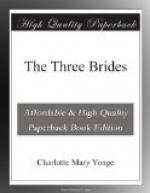“But I am free till eleven,” said Cecil.
“Free always, I hope,” he returned, with a shade of vexation. Therewith they descended the broad stairs into the panelled hall, where a great fire was blazing on the hearth, and Rosamond and the two young brothers were standing chatting merrily before it.
Julius, she said, had his primary sermon heavy on his mind, and had risen before day to attack it; and she sped away to summon him from Mrs. Poynsett’s beautiful old dressing-room, where he sat writing amid all the old associations. Anne was discovered hanging over the dining-room fire, looking whiter and more exhausted than the night before, having indeed been the first to come down-stairs. She was rebuked for fatiguing herself, and again murmured something about family worship.
“We must begin to-morrow,” said Raymond. “We have got a chaplain now.”
Julius, however, on entering excused himself, saying that after Sunday he should be at Matins at nine o’clock; whereupon Anne looked at him in mute astonishment.
Raymond, feeling that he ought to cultivate the solitary sister-in-law, began asking about Miles; but unlike the typical colonist, she was very silent, and her replies were monosyllabic, till Rosamond created a diversion by talking to Frank; and then Raymond elicited that Glen Fraser was far up the country—King Williamstown nearer than any other town. They had sent thither for a doctor for Miles, and he stayed one night, but said that mother’s treatment was quite right; and as it was thirty miles off he did not come again. Thirty miles! what sort of roads? Not bad for wagons. It only took two days to get there if the river was not in flood. Had she not been married there? Yes, they all rode in thither for the purpose. Was it the nearest church, then? There was one only nine miles off, to which papa went when there was service—one Sunday in three, “for he is an Episcopalian, you know.”
“And not your mother?” asked Cecil.
“I don’t think she was at home,” said Anne.
“Then had you a Presbyterian Kirk?” asked Cecil, remembering that in Scotland gentle blood and Anglicanism did not go together as uniformly as she believed them to do in England.
“There was one at Schneyder’s Kloof, but that was Dutch.”
“Then did you go nowhere?” asked Cecil.
“There was Mr. Pilgrim’s.”
“A clergyman?”
“No, a settler. He used to pray and expound every Sunday.”
“What does he call himself?” said Cecil, growing more severe.
“I don’t know,” said Anne. “He gathers together a little flock of all denominations, who only care to hear the word.”
“Such a voice in the wilderness as often does good service,” said Julius, with a perception that the side with which he least agreed best deserved support.
He and Rosamond were bent on a tour of parochial inspection, as were Raymond and Cecil on a more domestic one, beginning with the gardens.




